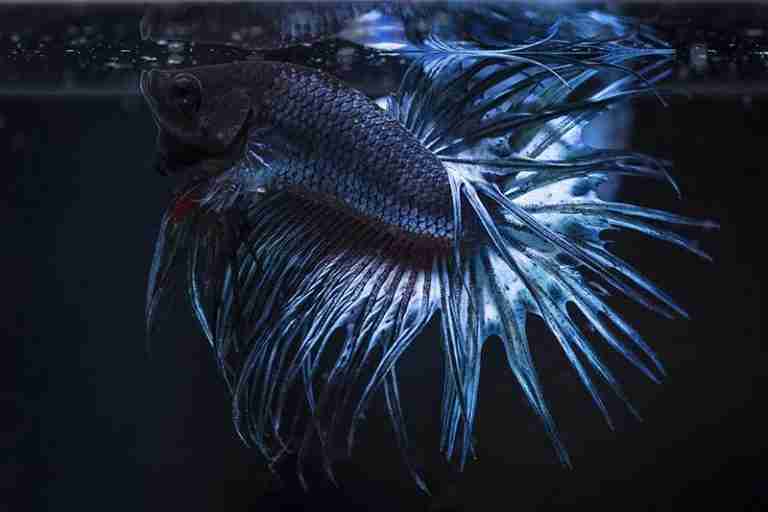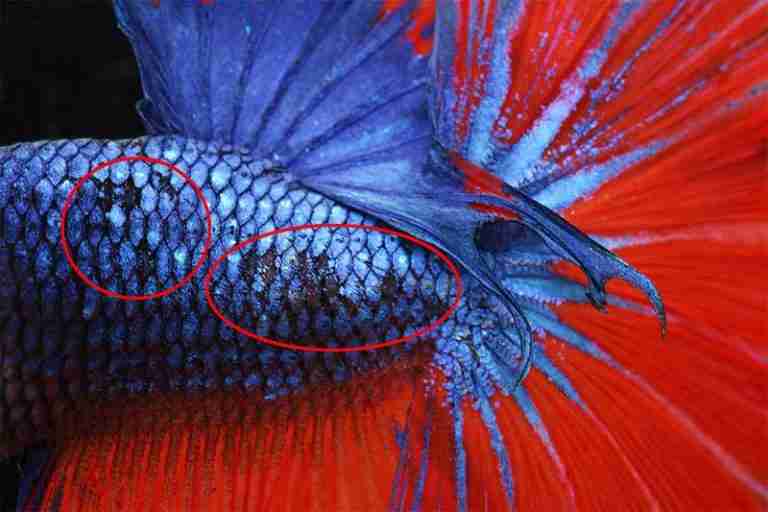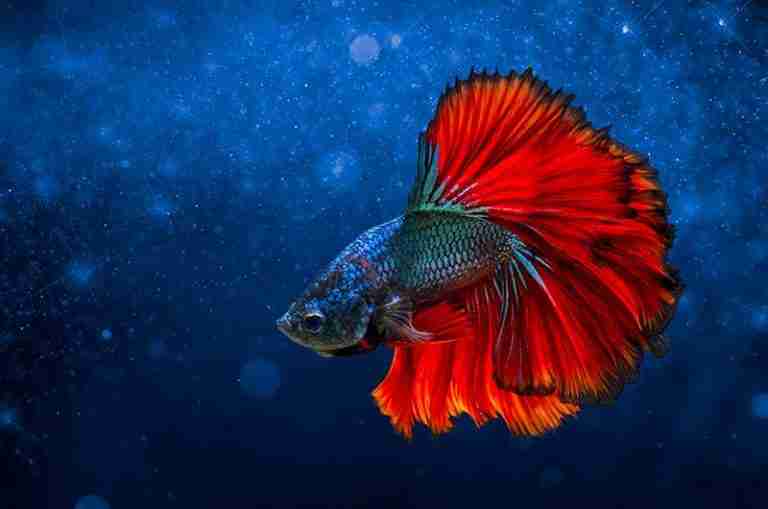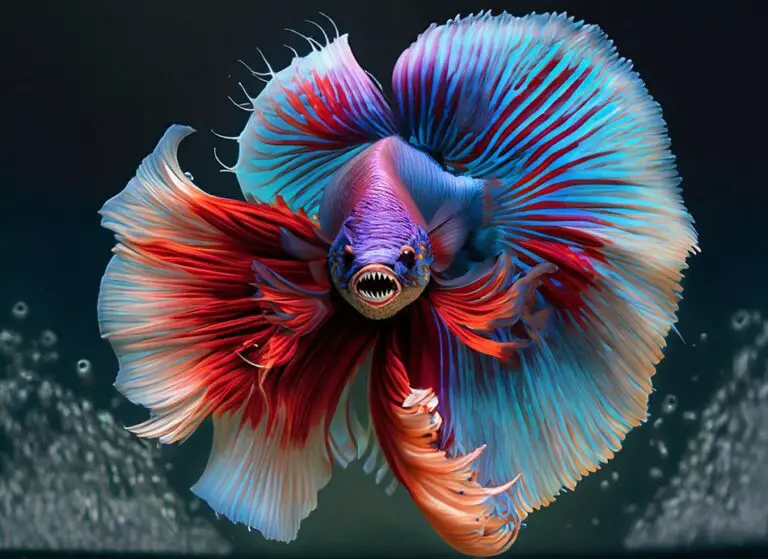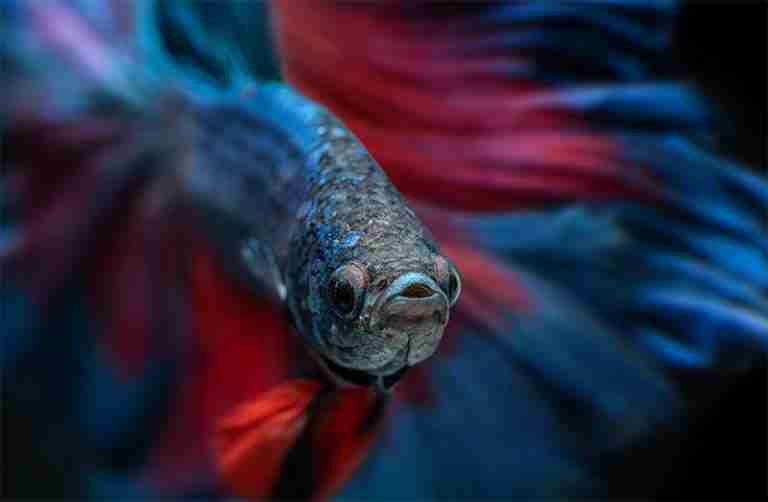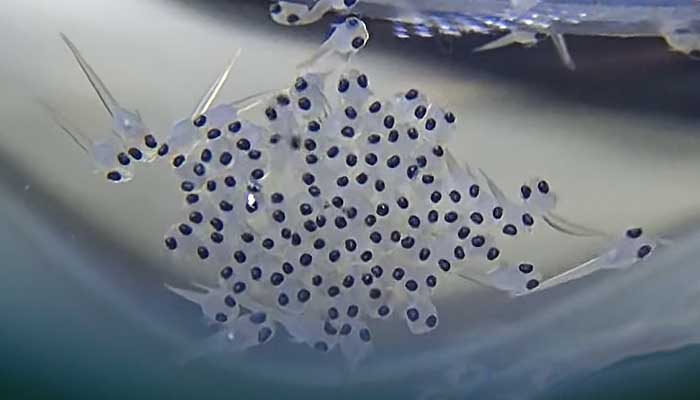How Long Can Betta Fish Go Without Food (Before getting ill)
Betta fish eat various types of food and are healthiest on a varied diet, but you must consider how to feed them while on vacation. Bettas are pretty hardy, and at a push, they can go for weeks without being fed, but how long can a betta fish go without food before getting ill?
Betta fish can go without food for 12 to 14 days before becoming lethargic or ill, especially in a good-sized, healthy tank. Betta fish will hunt leftover food from the bottom of the tank to keep them going. So before you take your vacation, overfeed them a little, and they’ll be fine.
With that being said, there are several factors to consider before leaving your betta fish unattended and without fish food for any length of time, and this blog post looks at those factors and provides tips on how to feed your betta while you are away!
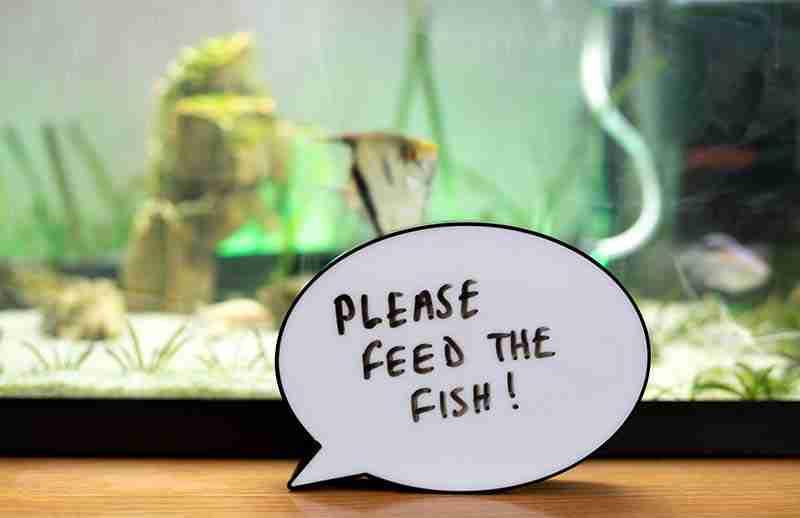
Make sure to check out our Betta Care Guide for beginners.
How Long Can Betta Fish Go Without Food (5 Factors To Think About)
If you are going on vacation, your betta fish should be fine without food for up to 14 days, but some important things to consider will help them remain healthy without food for longer.
Below are 5 of the main factors to consider:
1. Betta Tank Size
Betta fish can grow up to around 12cm and require a tank size of at least 40 liters – however, the bigger your betta’s tank, the better. If you’re going away for a week or two, ensure the tank is not too cramped, especially with other inhabitants.
Your betta fish can survive in the right environment by tapping on fat reserves when needed, but stress levels must be kept to a minimum for their body to function at its best. If you are going to leave your betta often and for extended periods, it may be best to invest in a bigger tank.
2. Temperature Of The Water
Water temperature can influence how often to feed betta fish. If the water temperature is too high or low, then your betta may not be able to live without food for that length of time.
If you’re going away on your summer vacation, it’s best to keep the tank somewhere cool, and if you’re going away during winter, make sure the tank is kept warm (at around 78-82°F/26-28°C).
Bettas are tropical fish and prefer warmer water, but they can become stressed if the water becomes too warm, which is never good for a betta fish.
Keeping a cooler tank will offer some benefits, especially if you are going for more than a week, as it will slow down your betta’s metabolism, burning calories at a slower rate so that they will survive longer without food.
3. Tank Environment
To keep your betta happy and healthy, having a few hiding places for them in their tank is best. This means having some plants or artificial decorations in there as well.
If you don’t want live plants, silk ones will also work fine, but live plants are also a small part of a bettas diet in the wild and will provide them with extra calories.
I’ve already mentioned that a larger tank would benefit your betta, and if you want to help them to survive while you are on vacation, water pollution needs to be kept to a minimum. Your betta tank water needs to be at its optimum, so check it thoroughly before you go.
4. Age Of Your Betta Fish
Baby betta fish need to be fed more often than adult bettas. If you have a young betta, it’s best to ask how long they have been in its current environment before deciding how long it can go without food.
Another consideration is how long they’ve been with you. If it’s only a few weeks, your betta fish can only go without food for shorter periods than if your betta is more settled and knows its feeding routine.
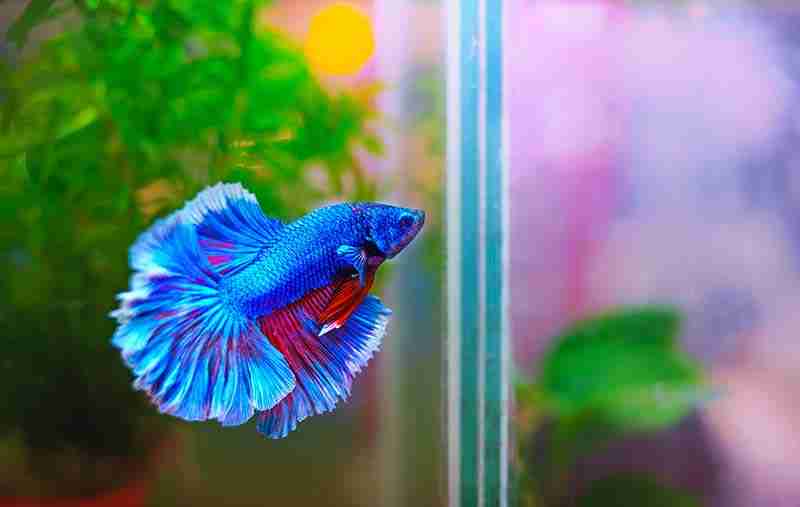
5. Your Betta Fish’s Current Health
If any illness or disease is present, how long betta fish can go without food will be shorter.
They won’t have the energy to look for any leftover scraps at the bottom of their tank, and if your betta has been ill in the past, it’s best to err on the side of caution when you are planning how long your betta can survive without food while away from home.
If your betta is not eating, it may be a sign of sickness or that your betta is dying, and it would be unwise to leave them alone at this point.
How Many Days Can Betta Fish Go Without Food Comfortably
Although I have told you that betta fish can go without food for up to 14 days, this is not ideal, and the potential for harm is there. A person can live without food for several weeks, but you wouldn’t want to, as the potential for internal damage or organ failure is very real.
Betta fish can go for many days without food quite comfortably, and taking small vacations of 3-5 days should be a walk in the park for them.
How Often Do You Feed A Betta Fish
As this is a post on betta eating habits, we may briefly cover how often they need to be fed and what betta fish should eat.
A healthy betta fish will cope much better when left for an extended period without food, and if you plan to leave them, it is important to understand what a good diet consists of to keep your betta fish healthy.
Many betta owners overfeed their fish and end up with lots of waste in the tank. A betta fish’s stomach is tiny, in fact, it is about the size of its eye, so it will not need large amounts of food to become full and content. When feeding your betta, the amount of food depends mostly on its size.
Small Betta fish require around one pinch of food (or two if it’s Betta food) once daily. Betta fish are carnivores; although they can eat some vegetables, this should be the exception, not the rule.
Betta Fish are usually picky eaters and will only pick at their food when it’s first put into the tank, so if you feed your betta in the morning, don’t worry if there is still betta food left in the bowl at night.
As Betta Fish grow larger, they will obviously need more food per day, and if you want to increase your betta’s growth rate, this is one option that can help you do that.
How much food they eat per feed can remain the same, but you can increase the feeds to twice a day as they grow bigger. Keeping an eye on ammonia levels in your betta tank will help you gauge if you are overfeeding or not, as you will often get spikes in the levels when water pollution increases.
A betta that has been fed healthily will cope much better when they are left without food for extended periods.
What Do Betta Fish Eat
Betta fish are carnivorous fish, and they will eat most meaty foods. Betta fish can be fed on commercial betta food, frozen bloodworms, brine shrimp, and live plants (although only rarely).
As carnivores, a bettas diet should contain mostly protein-rich items such as worms or insects. If you want to feed your betta some vegetables, this is fine occasionally, but it should not be the norm.
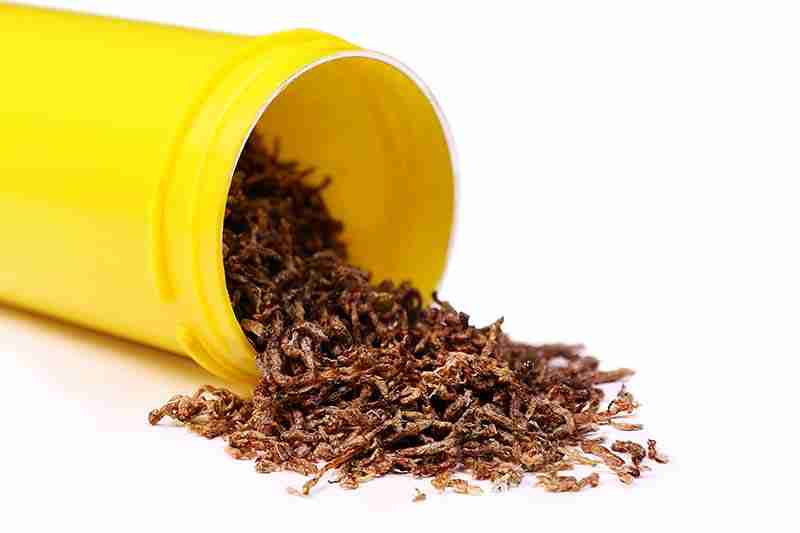
Although betta will eat plants if you have them in your tank, they will usually nibble at the edges and not be overly interested in them.
Fasting Your Betta Fish
Regular feeding is fine, although, with almost all fish, I find it best to fast them for a couple of days a week, and I do this every week. I find it helps avoid ammonia spikes from the rotting food, and fish will always find scraps lying around the tank when hungry.
Most fish tanks will have snails, which are usually introduced by accident as they hide under live plant leaves and lay egg sacks. Betta fish eat snails and actively hunt for them when fasting, keeping snail populations from taking over.
Fasting will naturally decrease waste levels as fish poop less and eat the excess food particles that are usually left to rot.
Not feeding your betta for a day or two is much healthier than overfeeding. It’s true, and I would recommend that you do some further research as it will certainly contribute to keeping your bettas healthy and may combat weight gain. Bettas will not eat regularly in the wild and are usually healthier.
How To Feed Betta Fish While On Vacation
Even though your betta can survive without food for up to 14 days, there are other ways to feed your betta fish while on vacation.
Automatic Feeders For Betta Fish
If you prefer not to leave your betta fish without food for 12-14 days, then one option is to use an automatic fish feeder. There are several options to choose from, such as pyramid blocks (or feeder blocks) or battery-operated feeders.
Many automatic feeders work on a timer and clamp on the top of the tank, releasing food at correctly programmed intervals. Automatic fish feeders may not be the best option for a betta fish tank because they require a lidless tank, and bettas are known to jump from their tanks.
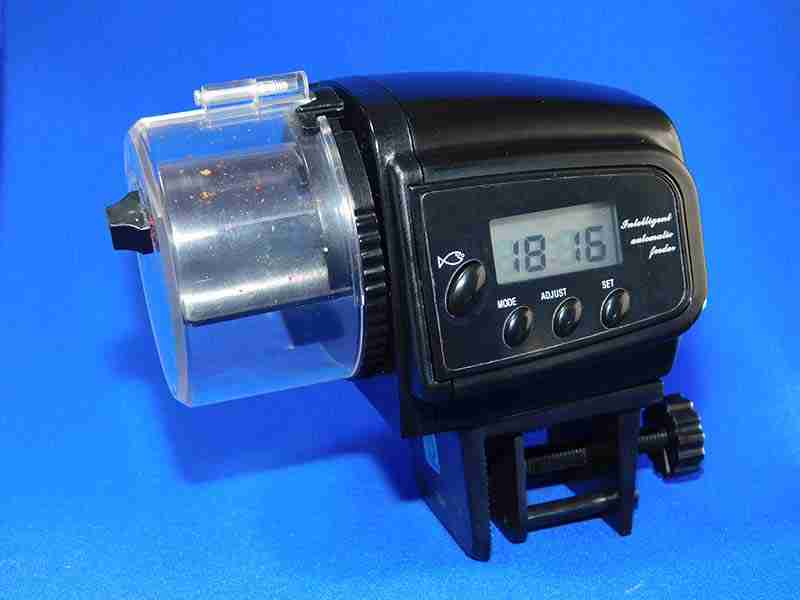
Automatic feeders can be quite useful, and if you are concerned about leaving the lid off your betta tank, you could set them up on a block or frame outside the tank instead of clamping directly to the tank, then create a hole just big enough for food to be dropped in.
A few of my favorite feeders are listed below. I highly recommend you check them out by following the link:
Decdeal Wifi Automatic Fish Feeder (Find out more)
Tropinova Automatic Fish Feeder (Find out more)
Boutigarden Indoor Automatic Fish Feeder (Find out more)
Slow-Release Food Blocks
Betta Food Blocks or pyramid blocks operate as a slow-release form of feeding. These blocks are placed at the bottom of the tank and will slowly dissolve, releasing natural ingredients which are healthy for most fish species.
If you choose to use food blocks, make sure they are suitable for your betta, and get some good quality ones that will dissolve consistently, so your betta is not overfed while you are away.
Food blocks should not be used as a regular feeding method but will work perfectly for those occasions when you are away.
What I Use
You will usually find feeder blocks or an automatic fish feeder at your local fish store, pet store, or online.
Compare prices At Amazon and Chewy on ‘Zoo Meds Slow Release Betta Banquet Blocks’ and ‘API 14 Day Slow Release Pyramid Blocks’.
Ask A Friend Or Neighbor To Feed Your Betta
If you have a good friend or neighbor you can trust as a pet sitter, you could leave your betta in their care while on vacation.
They will need to be given instructions on when and how much to feed your Betta fish and will be able to keep an eye on them without having any other responsibilities.
If they are uncomfortable feeding your betta, the automatic feeder or food block is worth considering.
Add Some Live Food To Your Betta Tank
Because betta fish are predominantly carnivorous, you can add a live food source to the tank. The benefit of live food is that it won’t rot while you are away, and your betta fish will have to catch the food before he can eat it.
Shrimp is a good choice of live food. Consider using brine shrimp, mysis shrimp, or freshwater scuds. Shrimp usually hide beneath plants or within the substrate, so your betta fish will enjoy hunting for them while you are away.
Preparing Your Betta Tank For Before Your Vacation
Your vacation is just around the corner, and there are a few things that you need to do with your betta tank before you go to avoid any health problems while you are away.
Below is a quick checklist to help you to get organized:
Make sure your Betta is eating well and is in good health
If your betta fish is in good health, it will minimize the risk of illness striking while you are away. Stress can also impact your betta’s health, so the chances of illness striking will be reduced by keeping stress levels down.
Tank Conditions should be at their optimum level
Poor water quality is a major factor that can lead to stress or illness. It is recommended to carry out a full water change the week before you go away or a 30-50 percent water change a day or two before you go. Make sure to add a water conditioner if you perform a large water change.
Make sure to vacuum the gravel or substrate thoroughly, removing food and poop waste that may decompose and cause a damaging ammonia spike while you are away.
Check the water parameters thoroughly with a test kit, and don’t overfeed your betta before you go.
Smaller betta tanks will need the most care as water conditions change more rapidly in such a small body of water.
If you have live plants in your tank, they will help with the biological lifecycle, helping to oxygenate the water and assisting the development of good bacteria. Having good bacteria in your tank will help with the nitrogen lifecycle keeping ammonia, nitrate, and nitrite levels down and the water quality at its best.
Raised ammonia levels can starve the water of oxygen and cause unwanted stress to your fish.
Check Your Aquarium Equipment Is In Good Working Order
Check all equipment, including filters, pumps, and lights (ensure they are working correctly). The heater is the most important equipment, as betta fish need a consistent temperature to maintain good health.
Betta tanks should have a heater that can maintain a stable temperature between 78-82°F (26-28°C).
It’s important to ensure the temperature is just right and cannot drop too low or fluctuate in any way during your time away. Make sure you move the betta tank somewhere safe, away from direct sunlight that may heat the aquarium water beyond a comfortable temperature during the day.
On the flip side, make sure your tank is not close to any draughts and make sure that your room temperature is comfortable.
I have mentioned previously that dropping your tank’s temperature can be beneficial to slow your betta fish’s metabolism. You can do this if you will be away for more than a few days. Adjust your heater to drop the temperature slowly, ensuring it will remain consistent.
You can drop the temperature to between 72-76°F (22-24.5°C), but make sure to return it to normal as soon as you return.
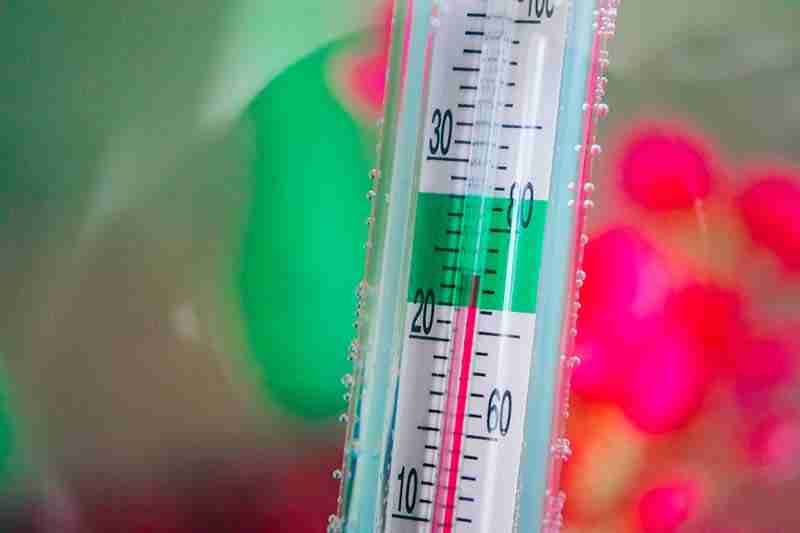
Your betta may appear a little more sluggish, but it won’t eat so much and will not need to burn any fat reserves that it has.
An air pump is unnecessary as betta fish can get oxygen from the water’s surface if necessary.
If you use a filter, ensure it is well-maintained and running properly before going away. Bacterial filters need cleaning once every two weeks or so, while mechanical and chemical filters should not require maintenance at all during your time away from home.
Check The Water Level
Be careful not to overfill your tank, as betta fish can jump, which can be a problem if you leave the tank for any length of time. Betta fish have been known to jump out and swim down into pipes, so it’s important that your betta is always secure in their aquarium.
Betta fish are used to living in shallow water as they live in rice patties, so they will survive with the water level being slightly lower than normal.
Consider Adding Aquarium Salt
It is not necessary, but some Betta owners add aquarium salt. It helps protect against parasites and also helps Betta fish heal from illness.
The recommended dosage is one tablespoon per gallon of water or half that for smaller doses of salt. Ensure you don’t add too much as this can harm your Betta’s health and cause your betta stress to the point where they cannot cope with being in their tank.
Check The Best Prices For API Aquarium Salt
Conclusion
Although betta fish can survive for up to 14 days without food, I wouldn’t recommend you do it often. It is useful to know your betta can go several days without feeding, and fasting helps digestion and overall health.
If you are going on a long vacation and have no other options, follow the steps above to keep your betta fish comfortable while you are away.
When you return home, all being well, your Betta should be healthy and happy, waiting for you!


